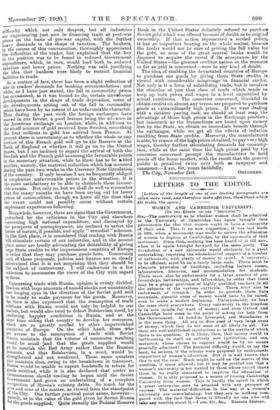LETTERS TO THE EDITOR.
[Letters of the length of one of our leading paragraphs are often more read, and therefore more effective, than those which fill treble the space.]
WOMEN AND CAMBRIDGE UNIVERSITY.
(To THE EDITOR OF THE " SPECTATOR.")
Sni.—The controversy as to whether women shall be admitted to the University of Cambridge has again brought into prominence the idea that women ought to have a university of their own. This is no new suggestion; it was last made in 1896, when a movement was made to secure the admission of women to degrees at Cambridge, by the opponents of that movement. Since then, nothing has been heard of it till now, when it is again brought forward by the same party. The foundation of a new university would obviously be a great undertaking, requiring the whole-hearted support of a number of enthusiasts, with plenty of money to spend. A university, to be efficient, must be on a fairly large scale. There must be adequate provision of buildings, including lecture rooms, laboratories, libraries, and accommodation for students. There must also be endowments for a large number of pro- fessorships, lectureships, and fellowships, in order that there may be a proper provision of highly qualified teachers in all the subjects of the various curricula. There must also be endowment of research. In order to provide these bare essentials, gigantic sums of money would have to be raised, even to make a modest beginning. Unfortunately, we hear the same story everywhere. Every university in the kingdom is in sore straits for want of money, and even Oxford and Cambridge have come to the point of asking for help from the Government. At London, Liverpool, and Manchester it is the same thing. All are in dire need of very largo sums of money, which they do not seem at all likely to get. Yet these are well-established institutions as to the merits of which there is no question. Is it likely, then, that money would be forthcoming to start an entirely new institution, and one, moreover, whose claims to support would be by no means, generally admitted? The financial difficulty would, to say the least, be serious, if the scheme were proposed by enthusiaetle, supporters of women's education. But it is well known that this is not the case. Much might be said on the merits of the question, if space allowed; but it may be pointed out that a women's university is not wanted by those whose record shows them to be really concerned to improve the education of women. It is only proposed as a means of freeing Cambridge University from women. This is hardly the spirit in which a great .enterprise may be attacked with any prospect of success. The material difficulties in the way of a women's university are overwhelming; but they are as nothing com- pared with the fact that there is literally no one who will take any trouble about it.—I am, Sir, dio., Bkasnie STEPILRN.






































 Previous page
Previous page